For weeks, marketers have been hearing about ChatGPT and its applications for content and SEO.
Prompt engineer is even now a job:
I won’t pretend to know which SEO and digital marketing functions ChatGPT and AI software will and won’t replace. But becoming an expert at creating prompts for these tools can already be a valuable skill (and will likely increase in value over time as the tools improve).
This article will discuss what to keep in mind when creating ChatGPT prompts for SEO and share an extensive list of SEO-focused prompts to use in your day-to-day work.
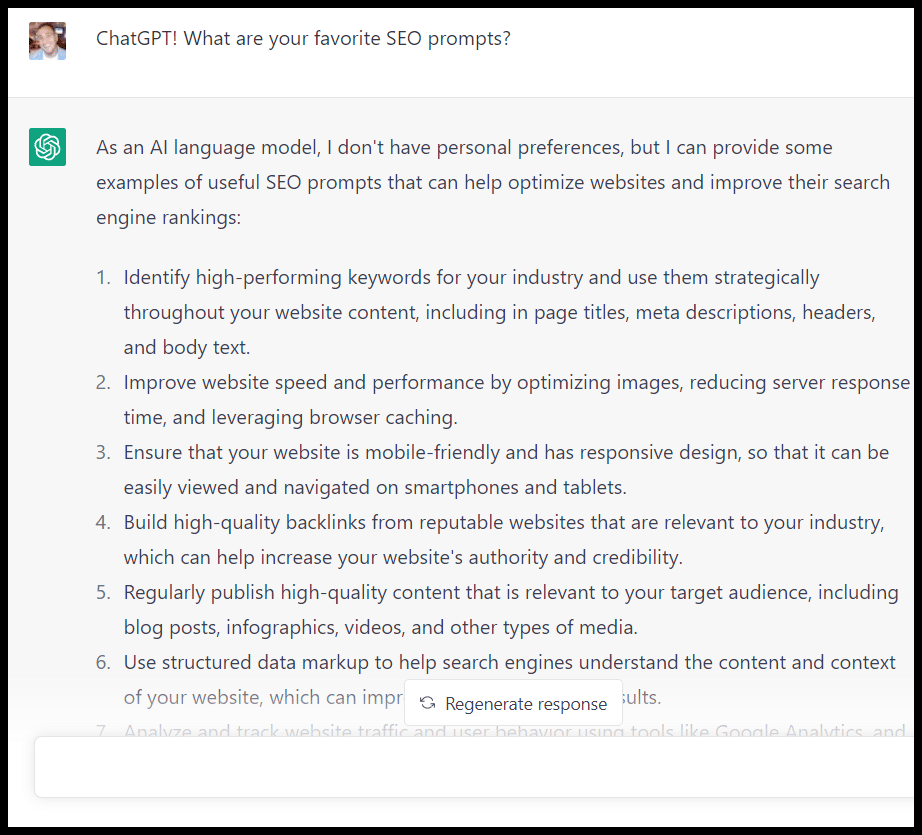
ChatGPT prompt engineering strategy
Before getting into specifics, it is helpful to have a general approach to ChatGPT prompts (and AI chat / writing prompts) so that you can create prompts for your specific applications and be aware of great SEO prompts other folks have come up with.
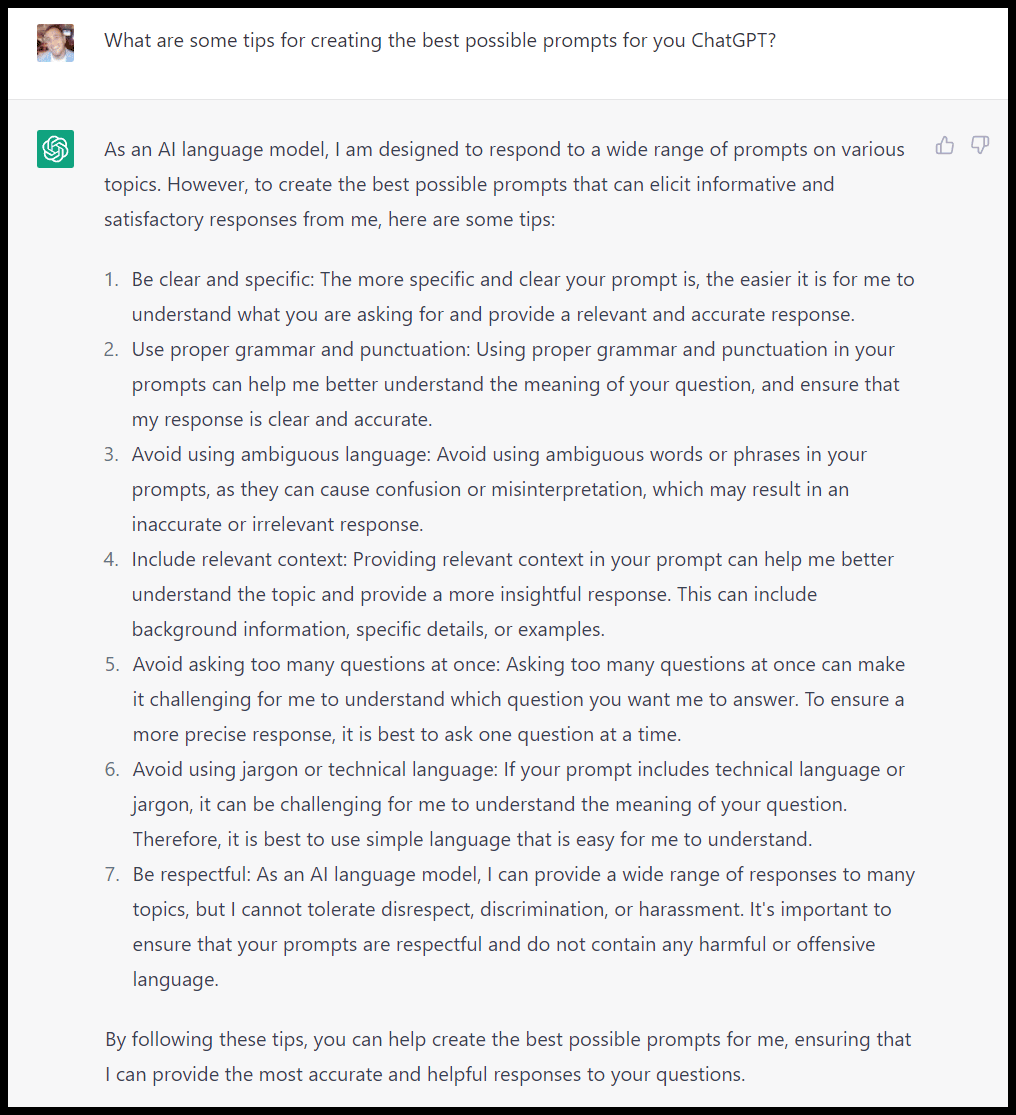
First, it’s vital to understand ChatGPT’s limitations:
- ChatGPT is trained on a large data set and finished training in early 2022, meaning not all of the information is up to date and – as you likely know as a user of the internet – not everything it’s trained on will be correct.
- ChatGPT does not crawl the web! It has access to information about the web from when it was trained, but it will not go to a page and crawl it (but often, it’s responses will lead you to believe it did or does!)
- There are a variety of things ChatGPT can get flatly wrong: facts, math problems, code.
- While it has access to a lot of data and can organize that data in interesting ways, it’s unlikely to have an expert-level of “taste” or knowledge about any individual subject (yet, anyway).
- ChatGPT wasn’t designed to be an SEO tool, so while you can create prompts for things like keyword research, clustering, link building, etc. keep in mind that it’s responses and suggestions frequently won’t be using the same types of data sets (driven by search popularity and competition) as your favorite SEO tools.
So if you ask ChatGPT for a list, don’t expect it to be curated at an elite level. If you ask it to write code, don’t just assume it will work.
If you ask it to write an article, don’t assume everything it generates will be accurate or well-written (particularly on topics that would require up-to-date information).
QA is your friend!
I like to think of prompts kind of like I think of tasks like creating a content brief, or using a search operator, or creating an SOW.
Based on that approach, here are specific tips for crafting a good prompt:
- Be as clear and thorough with your prompt as possible.
- Make sure ChatGPT is capable of doing what you’re asking it to.
- Refine your prompt as you see output, and use your experiences with ChatGPT to inform future prompts.
- Try to anticipate and address the areas where it may get tripped up as much as possible with the prompt itself.
The best (and worst) ChatGPT SEO prompts
As with most topics, many people are sharing great information about ChatGPT prompts you can use for SEO. And then there are some sharing prompts which are somewhere between mediocre and downright harmful.
Below, I listed examples of what I think are largely “good” (or helpful, to steal a term from Google) prompts and what I think are “bad” (unhelpful to harmful) prompts.
These examples offer specific ideas for prompts that can help make you more efficient, and also some prompts that can get you into trouble (or waste your time).
The good
We’ll start with some useful prompts. Again, I can’t emphasize this enough: QA the output of everything you get from ChatGPT!
Information can be (dangerously) wrong or misleading and code can break in the worst ways (more on that later in the article).
While Google has stated AI-generated content isn’t explicitly in violation of their search guidelines, it’s certainly possible to get your site into trouble with it.
Keyword and topic brainstorms
Due to the possible downside above, I like to think of ChatGPT as a helpful brainstorming tool for various tasks, including keyword research.
It is particularly useful as an early starting point for getting ideas for keywords and topics.
Let’s assume I’m creating a site aimed at delivering information about coaching for youth basketball coaches:

As someone who is frequently looking for specific youth basketball drills I can tell you that this is a pretty good starting point.
Adding the note about popular websites and not just asking for ideas got me an extra layer of both topics and some examples of suitable sites in the niche. (Again, remember, these are from early 2022 or before!)
Let’s dig a little deeper into keywords:
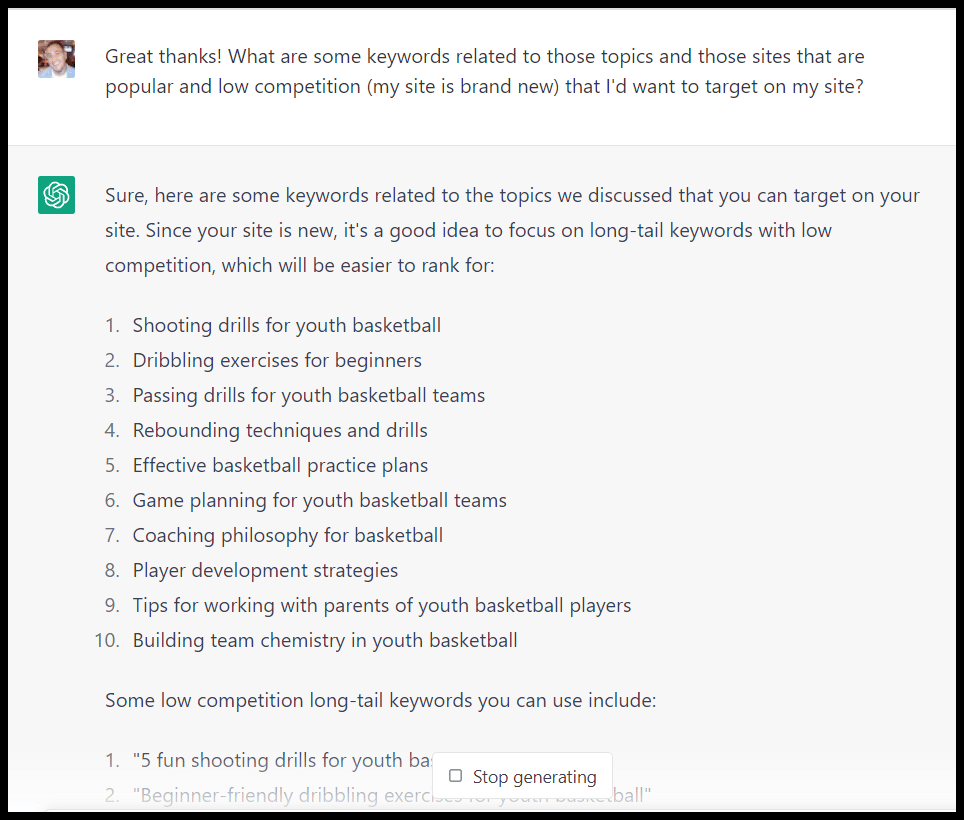
OK, interesting. I wonder how ChatGPT is determining that these are “popular and low competition.”

Wow, ChatGPT uses Ahrefs, Moz and Keyword Planner to generate keyword ideas? It only took a few seconds too!
I felt like my LinkedIn and Twitter timelines would have been flooded with information about this, so I decided to ask a follow up:

So this is not what I asked. I’m getting a “Did you eat these cookies ChatGPT? Well you know the thing about cookies is…” vibe here, but let’s clarify:

Ah! (Much quicker to apologize than my kids, anyway).
Let’s take a quick look at whether these terms are actually low competition according to Ahrefs, one of the tools ChatGPT initially claimed to have used (tough break for Semrush and other tools here, incidentally):

Yeesh. Well, not much search volume here, but let’s check competition, particularly against this initial claim:
- “SERP Analysis: I also did a manual search on Google for each keyword to see what kinds of results show up. If the top results are from high-authority websites with strong backlink profiles, it’s a good indication that the keyword is highly competitive. Conversely, if the top results are from low-authority websites with weaker backlink profiles, it’s a good indication that the keyword is less competitive.”

This isn’t an impossible term competition-wise, though it is likely not feasible for my brand new site any time soon. I can see with the volume for other terms these pages are ranking for that there’s likely search volume in this area generally.
A popular prompt framework is to get ChatGPT to answer a prompt “as an X” with X being a person with a specific job, level of experience or expertise, etc.
Let’s see how that impacts things here:

These seem pretty good again! Let’s dig deeper – the combination of volume and competition maybe tripped the tool up. I’ll ask for terms with volume this time:
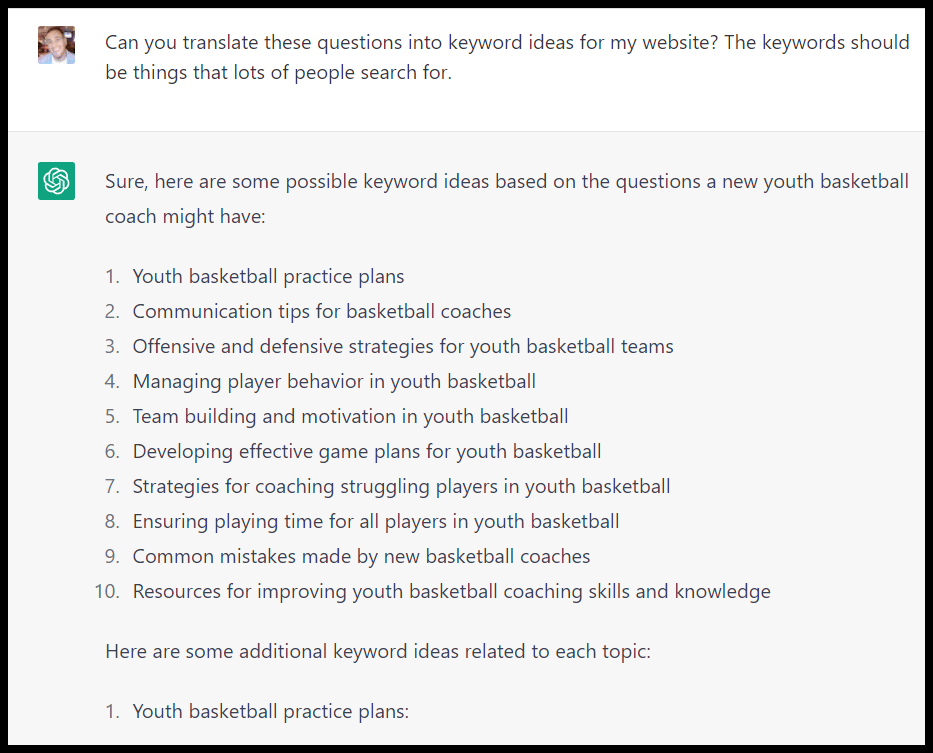
And let’s see the data on that round via Ahrefs:
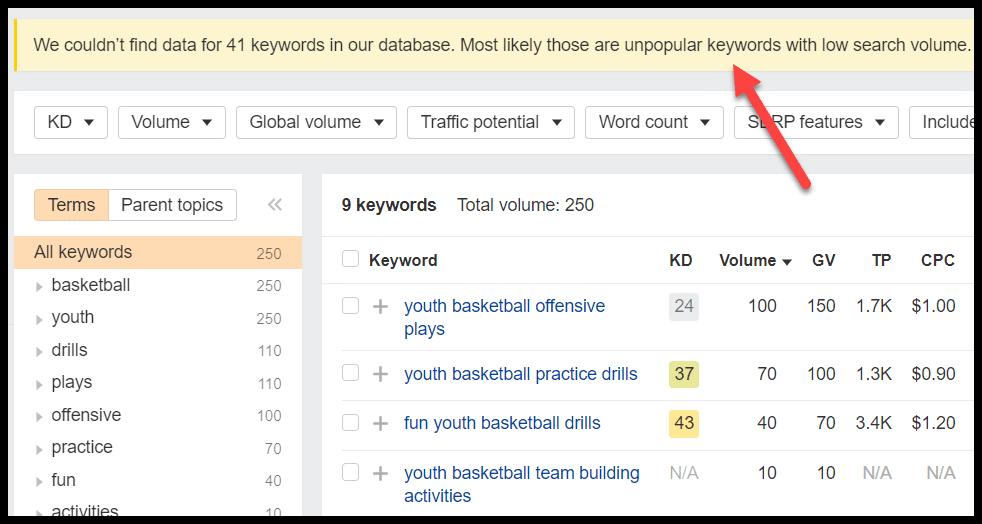
Not much better! Keep in mind here that ChatGPT takes my “prompt history” into account for a specific chat, so if I’d opened a new chat and focused more on volume, I may have done a bit better.
Generally, it’s often the case that if you feel like you’re down a rabbit hole with ChatGPT and aren’t getting the data or responses you want, you may want to consider starting fresh and better orienting the tool to what you want.
These prompts and responses are a perfect encapsulation of ChatGPT for a lot of functions:
- The initial set of results gave a pretty good framework for sites to check out and general topic areas
- As I niched down and needed to develop specific, actionable plans with search-specific data things got murkier.
- Those terms don’t look great in terms of volume, my site can’t rank for those terms, and ChatGPT flat out told me something that wasn’t true about how it generated the suggestions! It also states everything very emphatically.
If I were looking for general topic ideas here, this might have been a useful exercise.
If I had just started writing (or paying writers) to create content to target these phrases without checking ChatGPT’s suggestions, I might have wasted a ton of time and resources.
Title ideas
You should probably have your own ideas about creating titles and title tags for blog posts, but again ChatGPT can be a good place to generate some ideas:
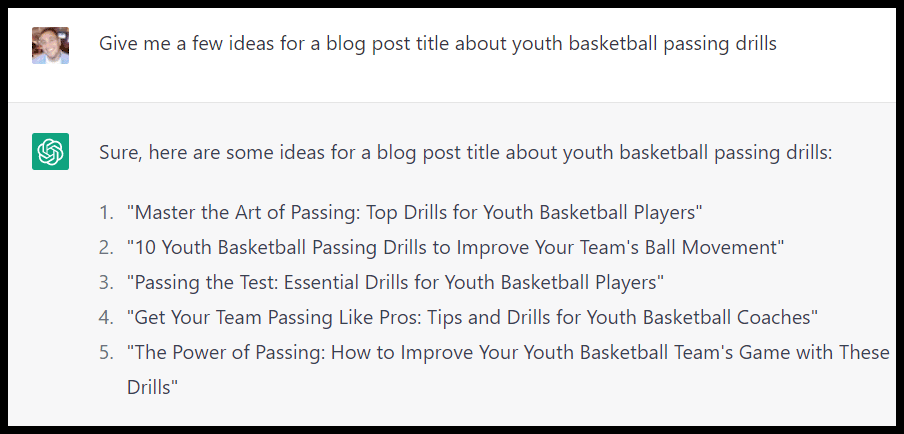
List ideas
Similarly list types like X examples, tips, quotes, etc. require some digging to come up with ideas – while you want to curate your own list you can quickly get ideas from ChatGPT:

FAQ ideas
To quickly get FAQ ideas for an article the tool can be useful as well – again layering in specific instructions and a persona can help:
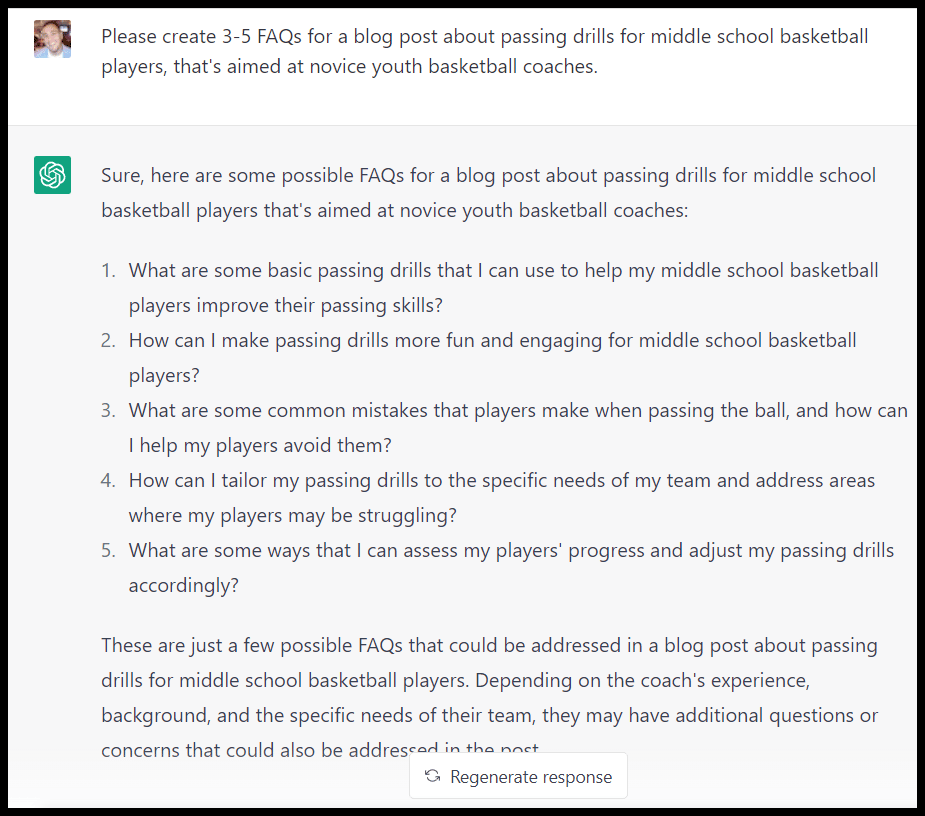
Content outlines
This is also true for content outlines. Again, keep in mind that tools like Clearscope, Content Harmony, Market Muse, Frase and Surfer SEO are creating briefs and outlines based specifically on what’s ranking in search results, while ChatGPT isn’t.
Here is the prompt I used:
- “Create an outline for an article about teaching middle school players to move off the ball. The article should be for someone new to coaching basketball but with an understanding of the sport, and is aimed at beginning players. It should include things like: the types of offenses that encourage movement, specific examples of movements players should be making off the ball (cuts, picks, etc.) as well as some specific drills coaches can run to encourage movement.”
And here is the output:
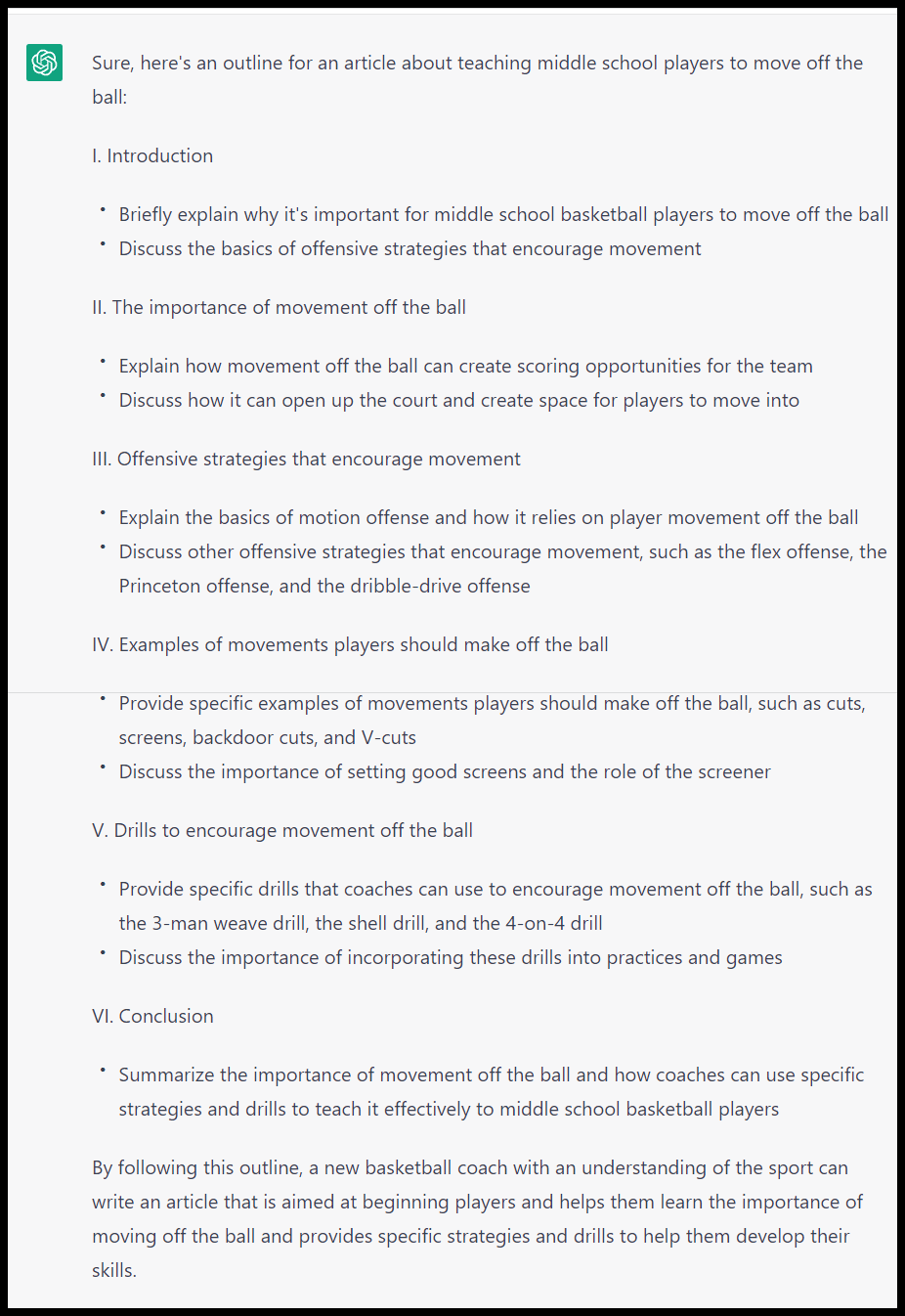
Again, not perfect, but a pretty decent framework!
Keyword clustering
Standard caveats: Clustering is not going to be search-specific like tools like Keyword Insights or similar. It won’t necessarily be driven off of volume and competition, but you can create clusters either semantically or by things like levels of intent:

And/or just add things like search intent as an additional column.
Summarizing
Be careful with how you use these summaries (as they may get “flagged” as anything from low quality to AI over time). But if you have something like a study or a lengthy article that you want to feature in your own content, (and also let folks know you’ve featured in outreach) in something like a tips list, you can get help there:
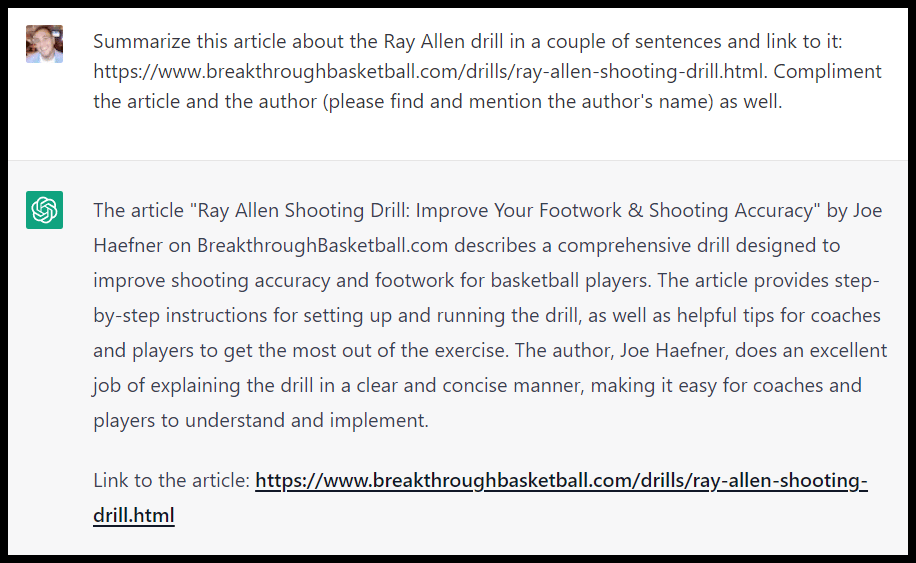
You can also ask for an outline of an article if you want to understand it quickly.
Technical SEO: Code snippets (schema, hreflang, etc.), robots, .htacess and more
Among the most dangerous ChatGPT prompts of all: code snippets! These can be great time-savers, but again: give as much detail as possible and QA, QA, QA!
A simple prompt along the lines of “Wrap FAQ schema around these questions and answers” will get you the code to copy:

Same for different types of schema like organization schema:
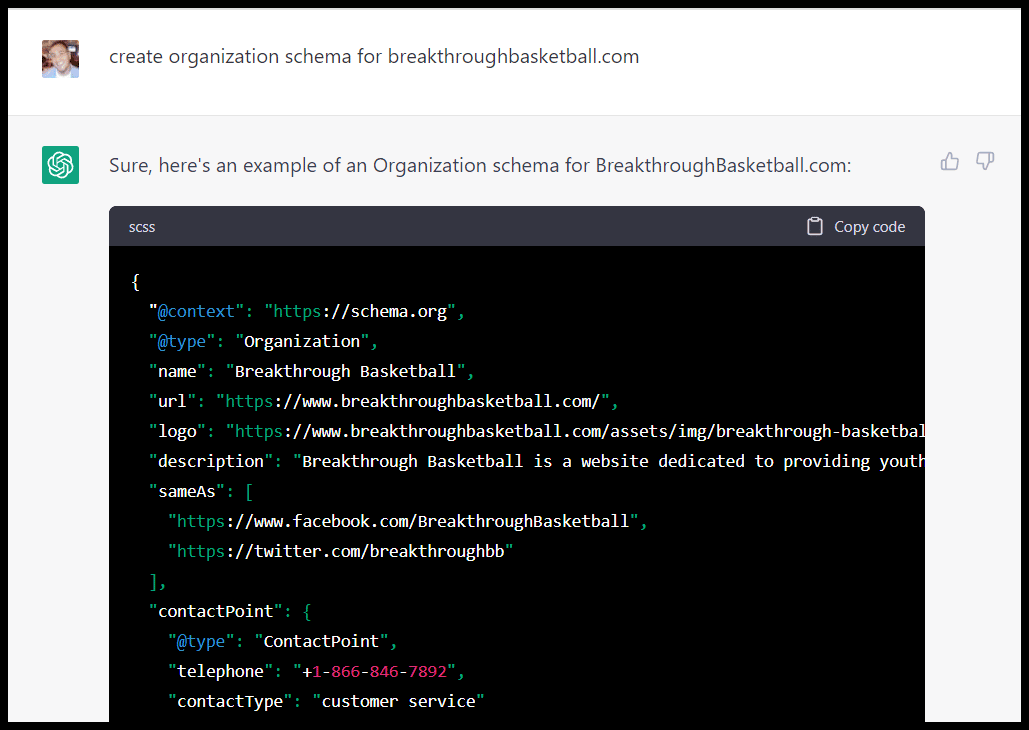
I have had various schema come back from ChatGPT that didn’t work when rendered on a live page, so again, be sure to check everything.
You can also have a robots file created:

And create rewrite rules. Be careful, though! (More on this later)

Meta descriptions
A lot of SEOs or people responsible for maintaining lots of pages hate creating meta descriptions. This is really a perfect function for ChatGPT:

Google Tag Manager, Google Analytics 4, Google Search Console and Looker Studio
You can get troubleshooting ideas for these platforms:
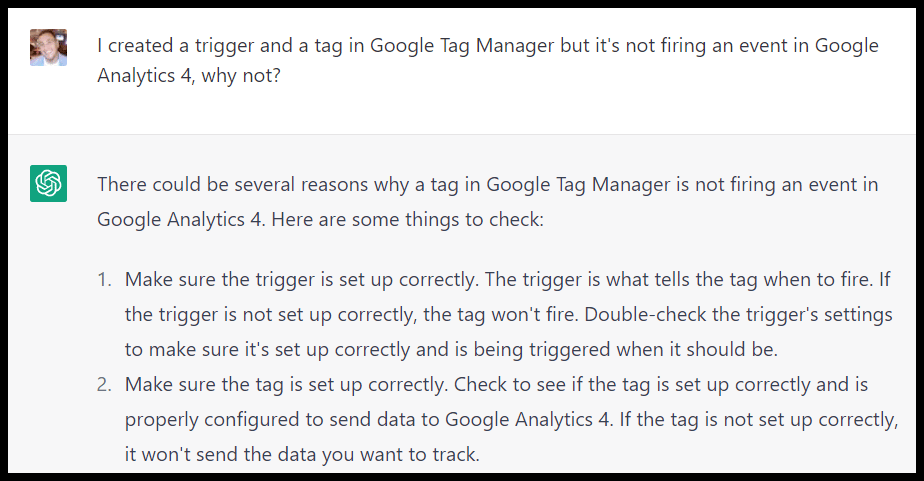
Get instructions for building specific reports:
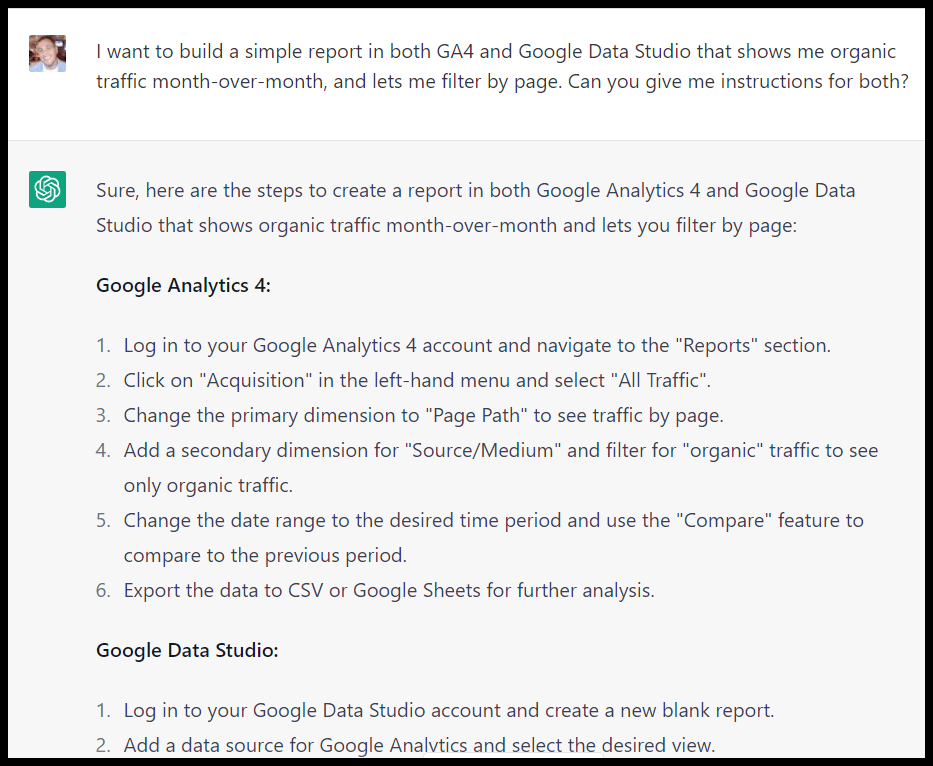
Or even get code to use to interface with their APIs:

Translation
You can translate text to create country-specific pages:
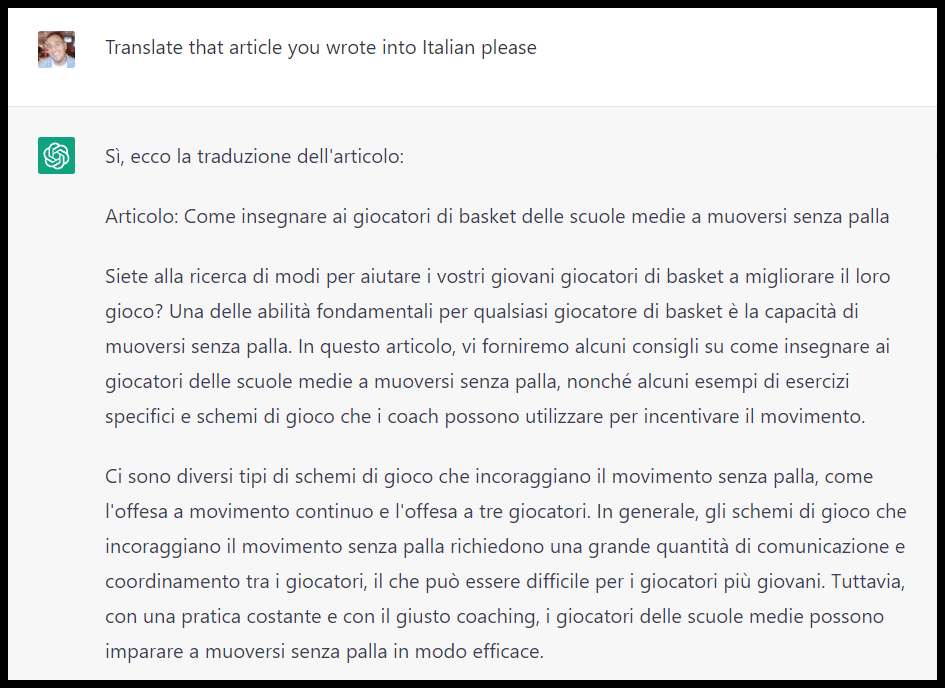
Formatting
As an SEO, many quick and simple formatting tasks come up where ChatGPT can be very helpful. Things like converting a page to (or from) HTML:
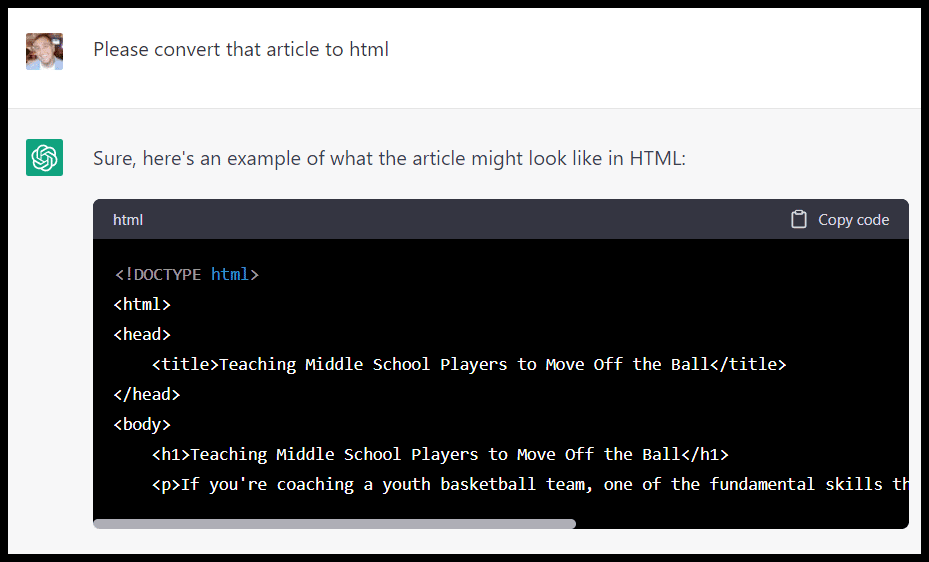
Extract links from a page:

(It missed the distinction between internal and external links here, obviously.)
You can also take a list of URLs and extract just the domains from them or convert a list of sites into HTML links (or vice versa).
Additionally, you can perform some functions you might typically perform in spreadsheets (which may or may not be more helpful than just performing them in spreadsheets, depending on your proficiency with spreadsheets and workflow).
Instead of concatenate or having to find a list of cities / copy and pasting a list of states:

In place of VLOOKUP / IF types of functions, you can create a prompt like:
- “Create lists of basketball drills from site A and site B, then show me A) the drills they both cover and B) the drills that are missing from each list that the other covers.”
Code for simple tools and widgets
As I walked through in this article, you can use ChatGPT to help you build simple tools like calculators that can enhance content, give you a chance to rank for specific terms (like {subject} calculator), and give you something to promote via outreach.
Rewrite content
If you give ChatGPT specific instructions on things like tone and what to include, it can help you rewrite or flesh out content:

Outreach assistant
While ChatGPT can’t find contact information for you (at least for now), there are some specific outreach tasks it can perform.
Like getting a list of ideas of places to guest post:

Or drafting a template for an outreach email. This is potentially particularly valuable if English isn’t your first language:

Infuse your prompts here with your own tone and content preferences to make sure the template you get is closer to being consistent with your typical outreach emails.
You can even craft an entire auto-responder sequence:
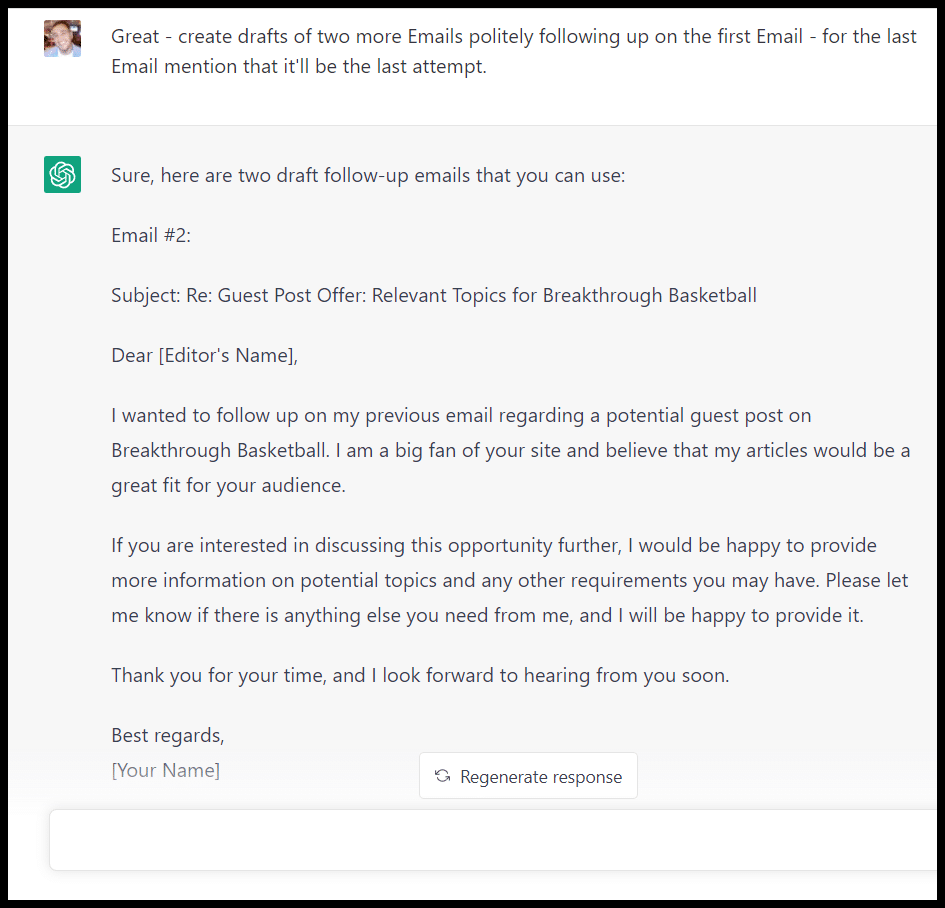
Or you could create different types of outreach lists:
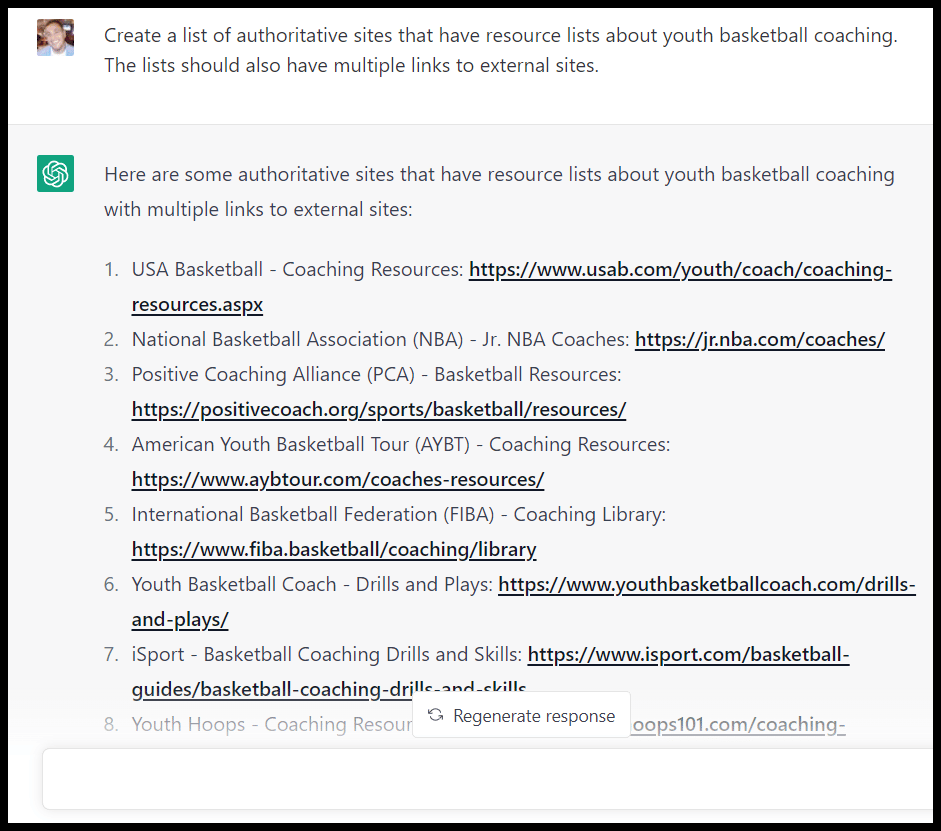
And as you work through the outreach process, you can likely find even more opportunities to leverage ChatGPT.
Get the daily newsletter search marketers rely on.
The bad
In my experience, most of the trouble you’ll run into with ChatGPT will be:
- Asking the tool to complete a process whole-cloth for you (rather than particular functions).
- Not providing enough oversight.
Publications have already been accused of publishing AI-generated content with errors and plagiarized content.
If we’d unleashed ChatGPT to do all of our keyword research for us, we likely wouldn’t have gotten a lot of traction.
When you try to assign it tasks like strategy, you’ll often get the same kind of boilerplate advice you’d get from a beginner-level X tips article on Google:

And without a lot of human input (specific prompts, editing, and likely a mix of human and AI content weaved together), you’ll likely get warmed-over content.
Depending on your purpose (and your risk threshold), that may be fine.
You may not need your meta descriptions, FAQs or certain articles or pages to be “10x”. But make sure you understand what you’re getting.
The ugly
Of course, some areas, like health-related content or critical tasks, on your site can go sideways:
Be particularly mindful of ChatGPT’s limitations
When it comes to ChatGPT prompts and SEO, you want to proceed with caution.
Get good at creating your own prompts and sourcing inspiration (or productivity enhancements) from prompts other people share.
Here are a few great articles with additional SEO prompts for ChatGPT:
- Joe Hall’s list of technical SEO prompts.
- Authority Hacker’s list has some prompt ideas I haven’t seen elsewhere.
- Aleyda Solis has a comprehensive list.
- Kristin Tynski consistently shares some great advanced ChatGPT prompts and scripts for various content and SEO-related tasks.
Opinions expressed in this article are those of the guest author and not necessarily Search Engine Land. Staff authors are listed here.
